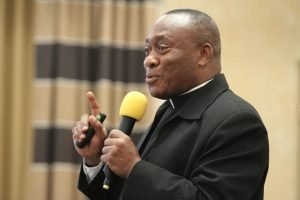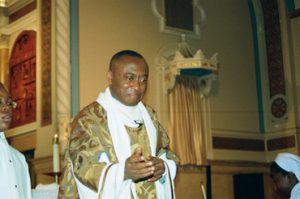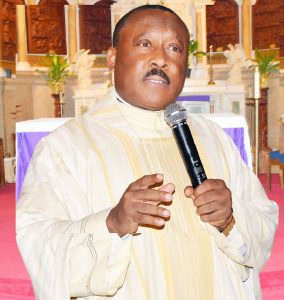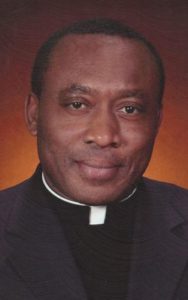In this concluding portion of our two-part interview with Monsignor Anselm Nwaorgu, the Monsignor delves into gender roles and marital discord, how to look for help when needed, the cure for procrastination and the nobility of the priesthood. Enjoy!
MONSIGNOR: Patriarchy has defined gender roles in a family, we understand it. Human beings know it. The woman knows her role. The man knows his role. And, therefore, we do not have a shady area in gender roles. You come to egalitarian society and gender roles become intermingled.
The intermingling of roles creates a confusion. But if this confusion is giving you more rights and authority, you embrace it. So, gender roles become a problem.
There is what we call the consequential reversed income inequality. In Nigeria, which is a patriarchy, men have tremendously more opportunity to make money than women. In egalitarian societies, especially with immigrants, the area of healthcare is a making-money area and a lot of immigrants are willing to go into it. It is an area where you are not discriminated against because of your race, or religion. It is all about work and skill. But because we are coming from patriarchy, a male does not see himself as a nurse or as a healthcare worker. That was not defined as a male role in patriarchy. But now, that role that we thought belonged to women, that we thought was feminine, is an area of income that creates disparity between men and women.

To quote Chinua Achebe, the bird Eleke Nti Oba said, that since men have learned to shoot without missing, he has learned to fly without perching. Men have now learned to become nurses too and to become all kinds of healthcare qualified workers. When women make a lot more money than men, it discombobulates the nature of marital obedience, because marital obedience has always been hung upon the provision of life and income by the man, when that provision becomes thwarted and a woman gets involved, the challenge to authority and equality, becomes valid.
There is also disparate marital adjustment, which I already mentioned at the beginning, because when you are owning privileges, women tend to adopt faster, they tend to become more American than anticipated because the environment is rewarding. Men are so angry about this environment; you always hear them say “if this was Nigeria” – this is not Nigerian and will never be Nigeria. Therefore, they’re still living in Nigeria, but they’re in America and that regret continues to hold them back from moving forward. What do we do?
 Remember the things I have mentioned. Put them together and you come with this solution women, slow down and men must pick up the race.
Remember the things I have mentioned. Put them together and you come with this solution women, slow down and men must pick up the race.
A guy once said blessed is a tree that can bend, it shall never be broken. If you are so stiff, to the point where you cannot bend and adjust, you are in for trauma in this life. One thing that is constant in life is change. And therefore, men must accept that things have changed. It has changed the patriarchal understanding of society, it has changed in the dynamics of income inequality, it has changed in the dynamics of marital adjustment, it has changed in the dynamics of marital commitment, all the four things I mentioned, we must accept that things have changed.
In any situation in which you have disparity, the burden of equality can never fall on one person. In any situation in which we have disparity, one person is here, and the other is over there. For them to come together, both must move. One person must slow down, and one person must pick it up. If you ask what person to slow down, the burden of reconciliation begins to fall only on one person. If you ask one person to pick up, the burden of reconciliation will fall on one person, you must address both the men and women from our home country. Men accept that things have changed. But women must slow down because there is also value in the marital situations where we come from. That marriage system has raised tremendous numbers of good people and good men. That marriage system has produced a tremendous amount of good families.
There is something good about marriage. It is consistent with the Bible. In fact, it is biblically based, so slow down. Life is not only about income. My father used to tell me that life is wider than logic. There is a lot more in life than how much money you make. There is a lot more in life than how much freedom you exercise. Because in every situation in which freedom is attained, one must not only give but also receive, and therefore these two people must make a move.
NPM: I feel like we have just had a graduate course in marriage. This is going to resonate well with our audience. So, thank you very much. I think you have already started talking about where we are going next, which is what do we do? Are there specifics that you want to get into here because I know that if we leave it at this level, some people are going to ask, how do I slow down and how do I catch up? Are there some specifics that you can throw out there that might help our readers?
NWAORGU: I think that a lot of our people have difficulty dealing with counseling because back home counseling happens through the native narrative of talking to relatives but here in the United States, it happens mostly through a professional. And the problem I have experienced with our own people is that counseling for them means correction. For our people counseling is about advising one person or the other. They come in trying to advise you on what to tell the other and that does not get us anywhere. So, my thing about our couples is: anytime there is a difficulty in a marriage, there is something that is going on with each of the spouses that they need to admit, take a look at and adjust.
 Instead of looking at what the other person needs to be told, ask yourself, what do I need to be told? But generally human beings are not that honest. We do not speak truth to the conscience. And that is why you need a psychologist, to be able to hear what is not said, and ask yourself a question.
Instead of looking at what the other person needs to be told, ask yourself, what do I need to be told? But generally human beings are not that honest. We do not speak truth to the conscience. And that is why you need a psychologist, to be able to hear what is not said, and ask yourself a question.
But our guys get incredibly angry when you ask them a question that allows them to self-reflect. Yet, no marital discord can be solved without self-reflection. There is something that each of them is doing, either one person is triggering something that another person is responding to or the response method is wrong. Every marriage forms an equilibrium, which is what we call an act response pattern. You do A, I respond B. You do C, I respond D. Then you do A again, I respond B. Before you know it, you have an equilibrium.
But you see that equilibrium becomes a gridlock and it becomes a problem. There is no way to solve that problem unless we can disengage that equilibrium, which means somebody must stop doing A and I will stop doing B or somebody will do A and I refuse to do B forcing that person, therefore, not to respond with C, but to jump to D. To understand how to respond is the function of a psychologist.
The second thing is that Nigerian couples must be careful in choosing a counselor. Some counselors are biased and that is not by choice. But because of their belief system, they are either very liberal or very conservative. It is always important, if you are somebody for whom faith and God is important, then seek a counselor who also understands the dynamics of marriage, within the Nigerian context, within the American context and within the context of faith. So that person can bring all three areas into your marital solution, because sometimes people can do things because of their relationship with God. At some point, it is important to remind people where they are coming from. Sometimes, people can change because they are reminded of where they come from and where they are going to. So, dealing with marriage here only from an egalitarian point of view is not going to be a solution, and from the patriarchy is not going to be a solution, and dealing with it only in terms of faith is not going to be a solution.
Remember, at the heart of our marriages here is personal dedication. And so, I think that in seeking psychologists and counselors, we need to be careful to seek those who understand where we are coming from, where we are, and where we could go, and who are also willing to speak truth to conscience. There must also be the readiness and the willingness to look inward for introspection, not just to look up what the other person is doing, but to accept that there is something I am also doing, and to focus on what I need to change in me. Because if you focus on what you need to change in you, and I focus on what I need to change in me, then both of us will be making changes that will impact us positively
NPM: You are presently the Consultant for Africa to the pastoral care of migrants and refugees and travelers at the United States Conference of Catholic Bishops. For someone who does not know what this is all about, can you explain a little about what you do?
NWAORGU: Yes. Thank you very much. I appreciate the clarity in your question. Let me explain something about the United States Conference of Catholic Bishops. Every country has a conference of its bishops. Nigeria has one. So, in the United States, there is a Conference of Catholic Bishops that governs the Catholic Church in the United States. This conference has standing committees as part of their functional structure, these committees have also some committees that look into various aspects of the mission of the church in this culture. One of the subcommittees in this conference of Bishops is the Office of the Pastoral Care for migrants, refugees, and travelers. This subcommittee looks into how the church in the United States can respond effectively and evangelize immigrants that come from different parts of the world, refugees and travelers. The subcommittee brings recommendations to the plenary session of the bishops. Many migrant groups, including African immigrants, and travelers fall into this subcommittee.
 Each of these groups has a bishop that represents it in the subcommittee. But those immigrant groups that do not have the bishop of their own, have chosen to elect consultants who now stand in the committee to advise the bishops on the pastoral needs of these migrants and what will be of benefit to them. I am the one chosen to represent Africa, because African immigrants have no bishop in the United States, just like the Haitians. I am chosen to be a consultant in the meeting of these bishops. Haitians have one, a consultant also. The Polish group has one. The Brazilians have one and the Caucasians have one. I am the consultant for Africa and the only consultant they have chosen to tell them and help them understand how to pastorally be effective with African immigrants in this church.
Each of these groups has a bishop that represents it in the subcommittee. But those immigrant groups that do not have the bishop of their own, have chosen to elect consultants who now stand in the committee to advise the bishops on the pastoral needs of these migrants and what will be of benefit to them. I am the one chosen to represent Africa, because African immigrants have no bishop in the United States, just like the Haitians. I am chosen to be a consultant in the meeting of these bishops. Haitians have one, a consultant also. The Polish group has one. The Brazilians have one and the Caucasians have one. I am the consultant for Africa and the only consultant they have chosen to tell them and help them understand how to pastorally be effective with African immigrants in this church.
 The Bishops go to meetings twice a year; they go to meetings in June and in November. The meeting usually lasts for one week. The very first day of the meeting, these subcommittees will meet with the bishops that are a part of the subcommittee. They will reflect and come up with ideas and proposals that will now be sent to the plenary session where other bishops will make a consideration of those consultative recommendations and then work out how that can become implemented as part of the response to the needs of immigrants in this country.
The Bishops go to meetings twice a year; they go to meetings in June and in November. The meeting usually lasts for one week. The very first day of the meeting, these subcommittees will meet with the bishops that are a part of the subcommittee. They will reflect and come up with ideas and proposals that will now be sent to the plenary session where other bishops will make a consideration of those consultative recommendations and then work out how that can become implemented as part of the response to the needs of immigrants in this country.
So that is what I do. Here in the United States, we have African Conference of Catholic Priests and Religious, which I was the first Executive President. I listen to that group, and I also listen to NAACUS, which is the National Association of African Catholics in the United States, when they have their meetings, and I bring their issues to the Bishop’s meeting. And during this subcommittee meeting, I will be called to speak to the bishops on what is going on with African immigrants in the United States. I will speak about what they are doing and make recommendations for future apostolate.
NPM: I read your book, Beating the Odds. In it you talked about procrastination. What do you think is the best way to deal with procrastination? Can anyone practice their way out of procrastination?
NWAORGU: I can only speak to what I know and what I have tried to do. The one thing I like to do is practice the things I write. I like to be the first one to experiment on them. So that when I speak about them, I am speaking from a point of view of authenticity. I do not write on anything that I do not do. That is the way I have tried to grow.
If you go to my website, you will see that I have a lot of writings that I post on my website blog and for every one of them I am the guinea pig for what I write. First, I look at procrastination as the devil’s workshop in which dreams are buried. This is my understanding of procrastination. Because I see it that way, then I believe, over time, and from my own readings, I have come up with a strategy to overcome this evil.
Let me tell you what happened when I wrote my dissertation. I was writing my dissertation, and I got to chapter four. After that, it took me five months to write chapter five. I had come to a stop. Nothing was working anymore. Until one day, one guy said to me, you wrote chapter one to four in such a short time. You have failed to write chapter five, because you have gotten yourself into the devil’s workshop. And I said, what is a devil’s workshop and he said procrastination. That is how I came up with that definition.
Because he mentioned the name devil, I concluded that the devil would not decide what I do anymore. I took off from my work for two weeks and finished my dissertation within ten days. Something I could not write in five months. I tell you that to tell you how that definition changed what I do. What is my strategy?

The first tool against every procrastination is to understand that procrastination is killing your dream and taking your goals away from you. Everything you postpone till tomorrow may never be done. We know that because we have friends who have gone to bed, extremely healthy, no problem and did not wake up. We have people who get up in the morning, extremely healthy, no issues, have an accident on the road and they die. There are people who decided to fly, to go work somewhere and never landed. The things that can happen to man are unpredictable. What procrastination does is to hold back a dream from ever becoming fruitful. Because of this understanding, and because I do not know tomorrow, I do not procrastinate.
Let me give you another example with today. I woke up this morning. I had adoration. I wanted to rest. But one mind told me to go get ready for this interview because if you do not get ready now something may happen this afternoon and you will never be able to prepare. This is a privilege the (Nigerian Parents Magazine) has given to you; they want to talk to you. You better be ready. I have time in the evening, I would do it then – that is procrastination. But what if something happens in the evening and I do not get ready? Immediately, I started getting ready for the interview. So, what is my point?
The very first weapon to deal with procrastination is what I call the will to start. The will to start would always drive you to finish. But you must start. Procrastination has its greatest effect on the will to start.
Have you ever entered your room to clean up your room and suddenly you do not want to stop until you finish it? But every day you go past your room and this day you just stop and put the towel away and it looks so nice. And you make your bed and it looks so nice. And suddenly you are cleaning up your drawers. And by the time you know it, you have cleaned the whole room. This is because the will to start sustains the will to finish. That is the beginning of every counterattack against procrastination.
Secondly, do not see what you want to accomplish from the start. See it from the end. If you can savor what your accomplishment looks like, you will be motivated to start and finish.
NPM: Thank you very much Monsignor. I know we have kept you a little over an hour already. We have a lot of young people that will read or listen to this interview. There may be some of them that may want to, someday follow in your footsteps. What general advice do you have for young people, especially those who are growing up in the diaspora. Could you give some general words of advice to our young people?
NWAORGU: To become a Monsignor, you first have to become a priest. Unfortunately, many parents do not propose the priesthood to their children as a possible vocation to pursue in America. We steer our kids towards being doctors and lawyers and engineers and healthcare professionals. We steer them to become accountants and pharmacists and all that. The vocation of priesthood begins from the family. It begins from the parents. I will tell you that most of the priests that you see today are priests because somebody guided them on that path.
The priesthood is a very noble career. I know it has come under a lot of scrutiny and negative judgment. But just like everything else in life, nobody is perfect. But if what you enjoy is letting people have some sense of faith to deal with life, then the priesthood is a wonderful career. My hope is that our families will encourage some of their children to look up to the priesthood and religious life. There is a tremendous amount of blessing that comes with it. The journey to Monsignor, to the Bishopric, and to anything in the Catholic church begins with becoming a seminarian, and becoming a seminarian leads you to the priesthood.
So, my hope is that our young people will begin to see the priesthood as a choice. Life is not only about wealth and money. There is also joy to be found in the service of being there for other people, in being the voice of God among men, in being the presence of God’s conciliative power for those who are in need, in being the direction for those who are confused, in being present when people are lonely and bereaved, in allowing people to hear the consoling voice of God when they don’t know where to turn. God does not function from heaven. God functions from earth, and the medium through which He functions is the human being.
The Bible says, I am looking for men to stand in the bridge between me and my people. That is the work of a priest – to stand in the bridge between God and His people, not because the priest is worthy, not because he is a saint, but because whoever God chooses, God will also qualify. Priests are qualified by God, not by their decent acts, but because God has chosen them to do God’s work, not man’s work. So, parents need to find joy in encouraging their children to look up to serving God in this way. Being a Monsignor and a Bishop is all accidental. Being the servant of God is the vocation and that is what we must aspire to.
NPM: Thank you Monsignor. It has been wonderful talking to you this evening. We are incredibly grateful that we had this opportunity. We want to reserve the opportunity to be able to come back to you at some point, because I think this is going to be a very well received interview and we might need a follow-up. But I wanted to say thank you on behalf of the Nigerian Parents Magazine, for taking the time to talk to us today. God bless you for what you do, sir.
Monsignor: Thank you Dr. Eze and our Honorable Editor-in-Chief. To be honest with you, I feel very privileged that you gave me this opportunity. It is not everyone that gets to be interviewed like this and be published. And for whatever reason, and however I came to your mind, I know that it is all part of the plan of God for all of us. Thank you for considering me for this interview and I wish you the best of luck in what you do.
To find out more about Monsignor Anselm Nwaogu, visit his website at https://www.franselm.com/

